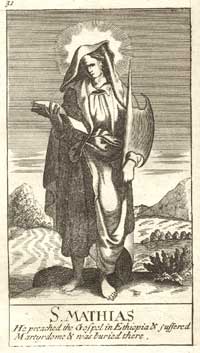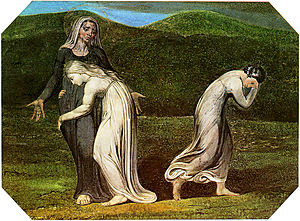
The French term for Fat Tuesday is Mardi Gras – which is now a generic term for “Let’s Party!!”
* * * *
 In case you missed it, last Friday, February 24, was the Feast Day for St. Matthias. (The “Overlooked Apostle” – as seen at right – of which more anon.) Then too, the end of the Book of Ruth came last Saturday, February 25, in the Daily Office Bible Readings. And finally, Lent begins next Wednesday – March 1 – and that season of penance and fasting is preceded by Mardi Gras.
In case you missed it, last Friday, February 24, was the Feast Day for St. Matthias. (The “Overlooked Apostle” – as seen at right – of which more anon.) Then too, the end of the Book of Ruth came last Saturday, February 25, in the Daily Office Bible Readings. And finally, Lent begins next Wednesday – March 1 – and that season of penance and fasting is preceded by Mardi Gras.
I wrote about St. Matthias in St. Matthias – and “Father Roberts.”
Briefly, Matthias was the apostle who took the place of Judas Iscariot. (After Judas killed himself.) Then too, Matthias is not to be confused with either St. Matthew – who wrote the first Gospel – or with Mattathias, who rebelled against the Roman Empire just before Jesus was born. (And who in turn was the father of Judas Maccabeus, “the greatest guerrilla in Jewish history.”)
You can see more about this “substitute 12th Apostle” at St. Matthias, or in the post about him and “Father Roberts,” noted above. But unfortunately we know so little about him that he is often referred to either as “Unremarkable Matthias” or the “Overlooked Apostle.”
Turning to the Book of Ruth: It’s about ”Ruth the Moabitess, the great-grandmother of David.”
 Also briefly, she – a foreigner – chose to accept the God of Israel as her God, and the Children of Israel as her people. And this was despite the disasters that happened to her mother-in-law Naomi, as shown at left. Naomi’s other daughter-in-law, Orpah, decided to leave Naomi, as also shown at left. (And a BTW: Oprah Winfrey was originally named “Orpah,” but people got confused.*)
Also briefly, she – a foreigner – chose to accept the God of Israel as her God, and the Children of Israel as her people. And this was despite the disasters that happened to her mother-in-law Naomi, as shown at left. Naomi’s other daughter-in-law, Orpah, decided to leave Naomi, as also shown at left. (And a BTW: Oprah Winfrey was originally named “Orpah,” but people got confused.*)
But it was the words that Ruth used – in refusing to leave Naomi – that made her famous:
And Ruth said, “Intreat me not to leave thee, or to return from following after thee: for whither thou goest, I will go; and where thou lodgest, I will lodge: thy people shall be my people, and thy God my God: Where thou diest, will I die, and there will I be buried: the LORD do so to me, and more also, if ought but death part thee and me.”
And that of course was the highly-poetic King James Version. (Which is of course “the Bible that God uses.” And for more, see also Ruth (biblical figure) – Wikipedia.)
Finally, there’s the upcoming season of Lent to talk about. I addressed the season last year in On Ash Wednesday and Lent – 2016. That post noted that Lent is a season devoted to “prayer, penance, repentance of sins, almsgiving, atonement and self-denial.” But it also noted that that season of self-denial is preceded by “Fat Tuesday.” That’s the day before Ash Wednesday, which means that this year Fat Tuesday is February 28.
The French term for Fat Tuesday is Mardi Gras, and Mardi Gras is now a generic term for “Let’s Party!!” Or as As Wikipedia put it, “Popular practices on Mardi Gras include wearing masks and costumes, overturning social conventions, dancing, sports competitions, parades, debauchery, etc.” That “debauchery, etc.” has come to include “showing skin for beads” as part of an “alcohol-fueled, nudity-filled bacchanal.” But because this party-time comes right before the beginning of Lent, there’s an object lesson here. That lesson? That “to every thing there is a season… A time to weep, and a time to laugh; a time to mourn, and a time to dance…*”
Have a happy and spiritually-fulfilling Season of Lent…
* * * *

* * * *
The upper image is courtesy of Mardi Gras Information & Updatesnola.gov.
The black-and-white image of St. Matthias is courtesy of St. Matthias, in the Satucket website listing the Daily Office readings.
Re: St Matthias, Apostle. The full set of Bible readings for his feast day are: Acts 1:15-26, Psalm 15, Philippians 3:13-21 and John 15:1,6-16. The Satucket website had this to add:
The man chosen [to replace Judas] was Matthias… Apart from the information given in the first chapter of Acts, nothing is known of him… [And a]bout most of the other apostles (those belonging to the original twelve and later ones like Matthias) we know little after Pentecost on an individual basis.
The caption for the image of Naomi, Ruth and Orpah: “Naomi entreating Ruth and Orpah to return to the land of Moab by William Blake, 1795.”
 “Note” also that an asterisk in the main text indicates a statement supported by a reference detailed further in this “notes” section. Thus as to people getting confused about “Orpah” Winfrey, see Oprah Winfrey – Wikipedia: “Winfrey was named ‘Orpah‘ on her birth certificate after the biblical figure in the Book of Ruth, but people mispronounced it regularly and ‘Oprah’ stuck.” Also, the caption for the photo at left: “Winfrey on the first national broadcast of The Oprah Winfrey Show in 1986.”
“Note” also that an asterisk in the main text indicates a statement supported by a reference detailed further in this “notes” section. Thus as to people getting confused about “Orpah” Winfrey, see Oprah Winfrey – Wikipedia: “Winfrey was named ‘Orpah‘ on her birth certificate after the biblical figure in the Book of Ruth, but people mispronounced it regularly and ‘Oprah’ stuck.” Also, the caption for the photo at left: “Winfrey on the first national broadcast of The Oprah Winfrey Show in 1986.”
Re: “To every thing there is a season.” See Turn! Turn! Turn! – Wikipedia, referring to the song written by Pete Seeger in the late 1950s, which “became an international hit in late 1965 when it was covered by the American folk rock band The Byrds.” In turn the lyrics were taken “almost verbatim from the book of Ecclesiastes, as found in the King James Version (1611) of the Bible,” at Ecclesiastes 3:1-8.
The lower image is courtesy of A Brief History of Mardi Gras – Photo Essays – TIME, which noted that “Mardi Gras isn’t all nudity and drunken debauchery (though, yes, there is definitely nudity and drunken debauchery). [Emphasis in original.] The blurb below the lower image added:
Mardi Gras’ reputation as an alcohol-fueled, nudity-filled bacchanal is not completely unearned. In 1973 … the tradition of showing skin for beads began. Native New Orleanians despise the reputation, and rarely venture into the Quarter during Carnival season.